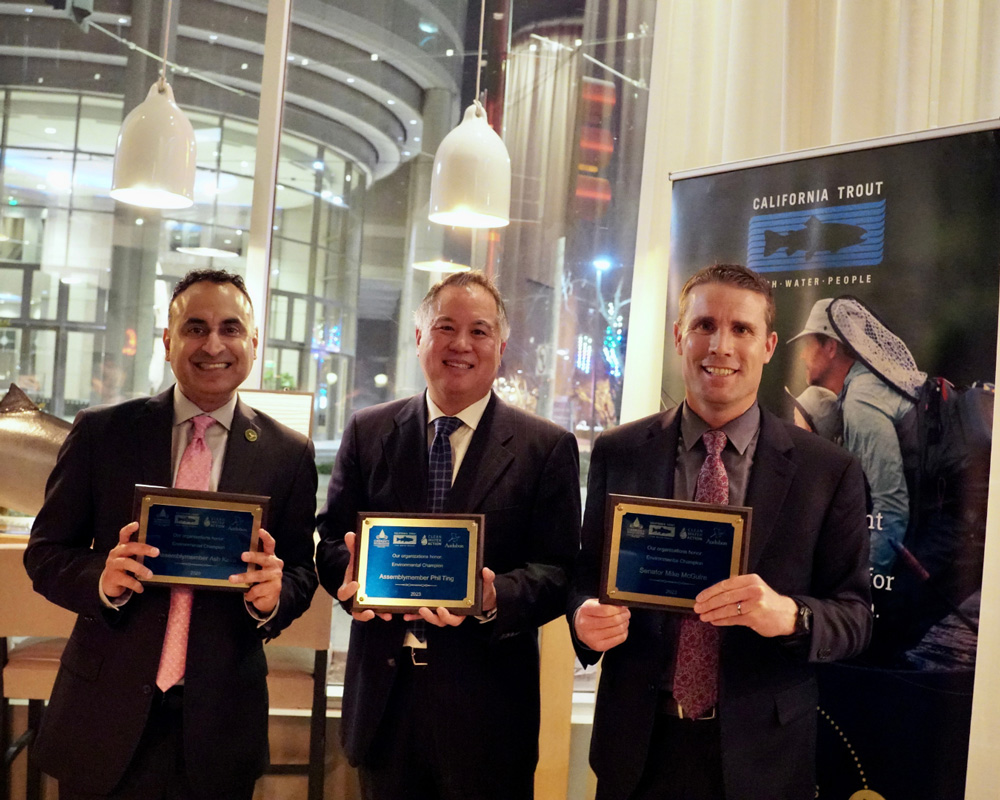Capitol Corner: Bills, Budget, Brick & Mortar, and the Busy Year Ahead
Opportunity to help our state’s freshwater ecosystems keeps calling, and CalTrout’s Legal & Policy Team is answering. This year, the team looks to broaden efforts across the state by sponsoring three bills, advocating for priorities in the state budget, and continuing our involvement in the state’s 30x30 initiative. With a new brick and mortar office just blocks from the Capitol building, our team is forming coalitions, making connections, and bringing CalTrout’s agenda to the forefront of policymakers’ minds in Sacramento and throughout the state.
Who's Who of CalTrout's Legal & Policy Team?

CalTrout’s 2023 Legislative Bill Package
This year, CalTrout is thrilled to co-sponsor three bills. The team will be collaborating with the legislative authors and our co-sponsors as the bills move through the legislature in the 2023-24 cycle. The first bill, AB 809, will establish a dedicated fund to support the long-term monitoring of California’s native salmon and steelhead trout populations. Next, AB 460, will empower the State Water Resources Control Board to act swiftly to prevent harm to the environment, public health, and water resources caused by illegal water rights violations. AB 1272 will lay the groundwork for creating a more climate-resilient future for native fish and for water supplies in coastal California. Keep scrolling to the bottom of this page for a deeper dive into each of the three bills.
"CalTrout is thrilled to be co-sponsoring these three bills that will reach across our state to create positive change for fish, water, and people. We're excited to keep you updated as these bills move through the necessary committees." - Redgie Collins, Legal & Policy Director
Advocating for Freshwater, Fish-Friendly Priorities in the State Budget
California recently unveiled the 2023 State Budget which saw significant reductions in revenue over last year. While claw-backs (reductions in previously proposed budgets) were prevalent across natural resources funding, CalTrout’s Policy team notes that the state’s spending to improve the health of the ecosystems we all depend on is still much higher than it was five years ago. With the budget proposed, our Policy team’s role is to work with relevant agencies to make sure funding is spent as effectively as possible, improving outcomes for freshwater, for fish, and for people. We work by lobbying specific budget changes we would like to see from the Governor’s office and continuing to engage in dialogue to ensure our expertise and priorities are taken into account.

"While our State Budget experienced claw-backs for natural resources funding, we're still in a really good place overall. I'm looking forward to bringing CalTrout's voice and expertise into the conversation to make sure good projects and ideas to support our fish and freshwater ecosystems receive the funding they deserve" - Kam Bezdek, Policy Associate
Continuing to Work Towards 30x30
30x30 is a statewide (and global) initiative to preserve 30% of our natural landscapes by 2030. CalTrout’s efforts to support the State’s 30x30 initiative is imbued across all our legislative and policy work and is specifically focused on advocating for inclusion of freshwater protections within the 30%. Associate Director of Policy Analise Rivero serves on the 30x30 Partnership Coordinating Committee, providing a continued presence by CalTrout in specific 30x30 discussions with the California Natural Resources Agency. As a part of the committee, Rivero will speak at the upcoming Environmental Law Section of the California Lawyers Association ongoing series called Your Valley Your Voice in Stockton, CA. Learn more about Rivero and the Committee’s role here.
"I'm excited to continue working on 30x30 to ensure California's important freshwater resources are not left out of the state's work. As a member of the Partnership Coordinating Committee, I'll be able to bring CalTrout's voice to the table each day." - Analise Rivero, Associate Director of Policy
Busy in Sacramento
In early 2023, CalTrout’s Policy Team moved in to a brick-and-mortar office space just a few blocks away from the Capitol in downtown Sacramento. Recently furnished – including the addition of some essential house plants – the office provides a launchpad for CalTrout’s continued presence in the region. Since moving into the office, the team’s calendars have been busy. In February, the Policy team hosted a Welcome Back to Session reception in Sacramento with Audubon, Clean Water Action, and Community Water Center. At the reception, we honored State Senator Mike McGuire for his efforts to prioritize natural resources on the North Coast. Legislators honored by other organizations included Asm. Ash Kalra, Asm. Phil Ting, and Asm. Steve Bennett. Earlier in February, Associate Director of Policy Analise Rivero and Policy Associate Kam Bezdek attended the California Women’s Caucus tour of the Pacific Flyway. And the months ahead look even busier!


More Info on CalTrout’s 2023 Legislative Bill Package
Codifying the California Monitoring Program (CMP): AB 809.
Authored by Assemblymember Bennett. Sponsored by the California Salmon and Steelhead Coalition*.
This bill will establish a dedicated fund to support the long-term monitoring of California’s native salmon and steelhead trout populations. The California Monitoring Program (CMP) was created to monitor and collect comprehensive data on our endangered anadromous fish populations, including Chinook salmon, coho salmon and steelhead to inform future management decisions. Currently, CMP is not written into statute, making it harder to fund the program fully. Our bill would put CMP into statute, which will allow us to ensure continuous operation of the program and eliminate data gaps.
Why should you care? This will improve our understanding of salmon and steelhead statewide, and the program it funds will help CalTrout and other entities understand whether the money that we put into restoration is having a positive impact. If you are a CalTrout donor this bill helps us ensure that your contribution is used effectively. Aside from supporting healthy fish populations, you should also care about this bill because it helps us identify where we do and do not have clean and healthy water – something that all of us rely on! When we uncover problems with our fish, it typically means there’s a bigger problem within the watershed. Knowing where and how to focus our restoration efforts means that we can ensure that the water around us is clean and healthy for all.
Increasing Penalties for Illegal Water Rights Actions: AB 460.
Authored by Assemblymember Rebecca Bauer-Kahan. Sponsored by California Trout, Trout Unlimited, and the Planning and Conservation League
This bill will empower the State Water Resources Control Board to act swiftly to prevent harm to the environment, public health, and water resources caused by illegal water rights violations. It grants the Board the authority to pursue immediate legal action to halt harmful water use practices that violate the Constitution, water quality objectives, water right permits and licenses, and fish and wildlife. CalTrout’s primary focus of this bill is to prevent illegal water diversions during curtailment actions. Illegal water diversions are harmful to endangered species of fish. Each year, illegal water use accumulates in frequency and harm highlighting the Board's relatively weak oversight. Last year, the Shasta River Water Association violated the state’s drought-informed order to cease irrigation. They illegally pumped water to farmers, and the case amassed attention when the maximum fine came out to only $50 each. To them, it was the cost of doing business. Under this new bill, violators could be fined up to $10,000 a day and $5,000 per acre-foot.
Why should you care?
California's rivers and streams provide crucial water supplies for fish, families, and farms. Illegal water diversions are an existential threat to our state's already limited water resources, as every stream supports the water supply of California's residents. With no severe deterrents, illegal diversions threaten the health of the environment and will threaten your community's access to a vital resource should your stream suffer from illegal diversions. The State Water Board needs the power to enact effective deterrents to secure communities' water supplies throughout the state.
Coastal Watershed Climate Resilience: AB 1272
Authored by Assemblymember Jim Wood (D-Healdsburg). Sponsored by California Salmon and Steelhead Coalition*.
This bill will lay the groundwork for creating a more climate-resilient future for native fish and for water supplies in coastal California. It would direct the State Water Resources Control Board and California Department of Fish and Wildlife to work together to develop plans for the use of water in coastal watersheds during times of water shortage, enhancing drought preparedness, climate resiliency and protection of aquatic ecosystems. Developing dry-year water management plans at the watershed level will enable water users and stakeholders to create proactive drought response measures that are tailored to local conditions. It would also inform future investments in watershed health and water supply reliability.
Why should you care?
Drought in California is the new normal, and our state government currently lacks the appropriate mechanisms to plan ahead for impacts. Having a consistent and predictable drought response helps ensure drinking water for people and streamflow for fish, especially along the coast where some of our best strongholds for fish remain. If you live in coastal California, this bill will have a direct impact on your community. It will help ensure that your community is ready to tackle drought impacts as they inevitably occur.
*What is the California Salmon and Steelhead Coalition?
The Salmon & Steelhead Coalition is a strategic partnership between The Nature Conservancy, Trout Unlimited, and California Trout that works to restore salmon and steelhead rivers on California’s North and Central Coasts. We coordinate on science, on-the-ground projects, and local and state policy that advance our mission to support both the water supply needs of people and the recovery of coho salmon and steelhead.







